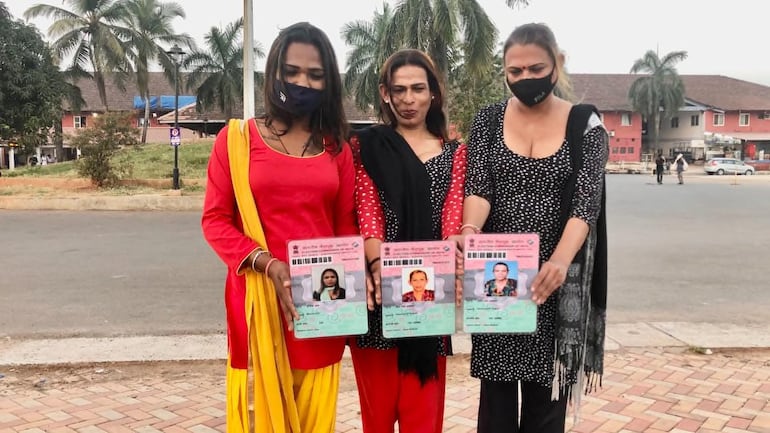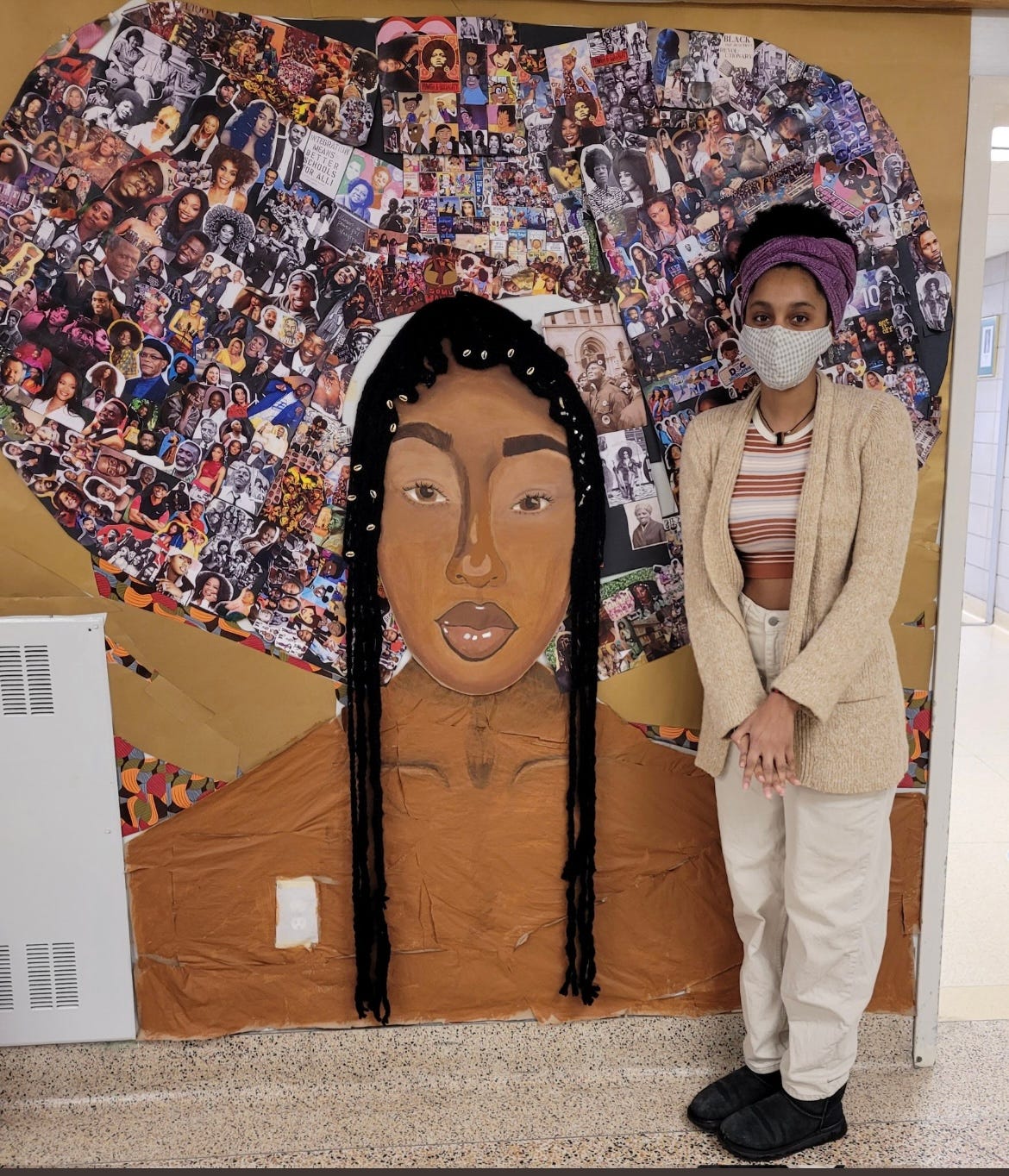Global Roundup: Yemeni Women Launch Businesses to Fight the Pandemic, Trans People Vote in Recognized Gender for 1st Time in Goa, Student Celebrates Black History Month With Art
Curated by FG Intern Lydia Georgison
Nadia Al-Dhrah supervises the work of tailors at Jana Sewing Labs for Medical Outfits in Sana’a, Yemen on 30 December, 2021. Thomson Reuters Foundation/Deyah Al-Mandi
Yemeni women are braving airstrikes and internet outages to launch businesses to fight the pandemic.
Nadia Dhrah, a doctor, vowed to help in any way possible when Yemen’s overstretched medical workers, short of masks and protective gowns, started to die from Covid-19. She believed her small business that made surgical masks and clothing could meet the demand for personal protective equipment more quickly than expensive imports amid a deepening currency crisis after years of war.
Doctors were dying. Suddenly face masks were in high demand. We jumped into action and began producing as much (PPE) as possible. – Nadia Dhrah.
Dhrah is among a growing number of Yemeni women defying conservative notions regarding gender roles. Her factory is one of the scores of women-owned businesses that have been able to adapt to Covid-19 and even prospered during a seven-year conflict.
Yemen is embroiled in a war between a Saudi-led military coalition and the Iranian-aligned Houthi group. The war has had devastating effects on its economy and health care system and has also unleashed the world’s most urgent humanitarian crisis, with millions facing starvation and diseases.
With less than 1 percent of the population in Yemen being vaccinated against covid-19 and with state bodies collapsing, female entrepreneurs have stepped up and provided vital services such as managing bakeries, running language and training institutes, and establishing women-only cafes.
Society didn't use to believe women could run businesses and underestimated their abilities for a long time. These exceptional challenges have seen women excel at business and change attitudes, inspiring other women. - Faizah Aslulimani, partnership director at a national agency supporting entrepreneurship and business development.
The war in Yemen has upended traditional gender roles as women business-owners step into the vacuum left by tens of thousands of men who have lost their government salaries or gone to the frontlines to fight.
Covid-19 has also created new demand for products that women-led businesses are meeting. Safia Omar, who runs an oxygen plant in southern Yemen, has been inundated with hospital requests for oxygen canisters to battle respiratory conditions from Covid-19.
Women entrepreneurs are also providing skill training. Muna Mohammed worked as a teacher and noticed the desire among women and girls around her to acquire skills that would allow them to generate income.
When the Education Ministry stopped paying her wages and the salaries of thousands of other teachers in 2016, she used her savings to open a private institute to teach women computing, sewing and first aid.
Mohammed has a goal to see other Yemeni women begin their businesses to provide for their families and meet the needs of female customers.
I foresee many women starting their own firms in the future because women have already broken taboos and entered the market with their own projects. - Muna Mohammed
Tans women who recently received their voter ID cards in Goa, Zareen, Heena and Monica. (Photo: India Today/Pankaj Upadhyay)
A group of trans people in Goa, India, were set to vote in their recognized gender for the first time on Valentine’s Day, marking the first time the niune trans community would vote using voter registration cards that correctly record their gender. At the previous Goan elections in 2019, there were no registered trans voters.
India’s supreme court legally recognized trans people as a third gender in 2014 when the trans population was approximately three million. However, registering is slow, and many trans people do not have access to it.
Now, seven trans people from South Goa and two from North Goa have been registered as ‘third gender.’
We were trying to enroll transgender [people] in the electoral polls, and with the help of several NGOs, seven transgender voters have been enrolled. – Goa’s chief electoral officer
Trans people in India often lack identification documents or have documents of the wrong gender, excluding them from voting. While ID documents in the correct gender are available through online portals, without a diagnosis of gender dysphoria, activists point out that many trans people will not have access to computers.
This has resulted in many trans people in India being excluded from social safety nets, making it difficult to get jobs or secure housing. Therefore, many often end up begging or doing sex work to survive.
Three of the trans women who were set to vote on February 14, Zareen, Heena and Monica, spoke to India Today about their lives; they talked about how they make money through begging at a train station.
Whenever a train stops at the station, we get inside and ask passengers for money. Some feel that our blessings are good, hence, they give us money, but many abuse us. Still, many say nasty things to us and tease us with various names. -Heena.
Image via Loyalist Collegiate and Vocational Institute
Weeks of work and planning went into an art piece made by Grade 12 student Tanesha Duncan-Zulu, all in honour of Black History Month. A wall of Black history and celebration is what greets those entering Loyalist Collegiate and Vocational Institute.
I really wanted Black individuals to feel represented in Limestone. And also, just to plant a seed so that other people can kind of like follow what I’m doing next year and the years after that.”-Tanesha Duncan-Zulu
Tanesha says the feedback she’s received from her work has been just what she was hoping for. According to the LDSB 2020 student census, approximately four percent of Limestone students identify as Black, in comparison to the 86 percent who identify as white.
Especially living in a predominantly white area, it’s very hard to struggle with your identity. And when you see, you know, schools and admin taking care of our students and being like, ‘Hey we see you,’ especially with the natural hair (art) piece…I really want to make sure that they feel comfortable in their own skin and feel celebrated in their own skin. - Tanesha Duncan-Zulu
Tanesha Duncan-Zulu hopes that seeing her art piece on display will encourage other LDSB schools to follow suit and more actively engage in Black History Month. But for now, her tribute will remain at LCVI as a constant reminder that representation matters.
Lydia Georgison (she/her) is a first-year student at the University of Ottawa. She is passionate about becoming a feminist by learning and broadening her knowledge of topics that have to do with feminism. She spends most of her time studying in the field of criminology.
Lydia strongly believes the key to excellence within society is listening and learning from everyone’s opinions. She suggests that the key to a peaceful and accepting community is the result of educating ourselves on controversial topics.







